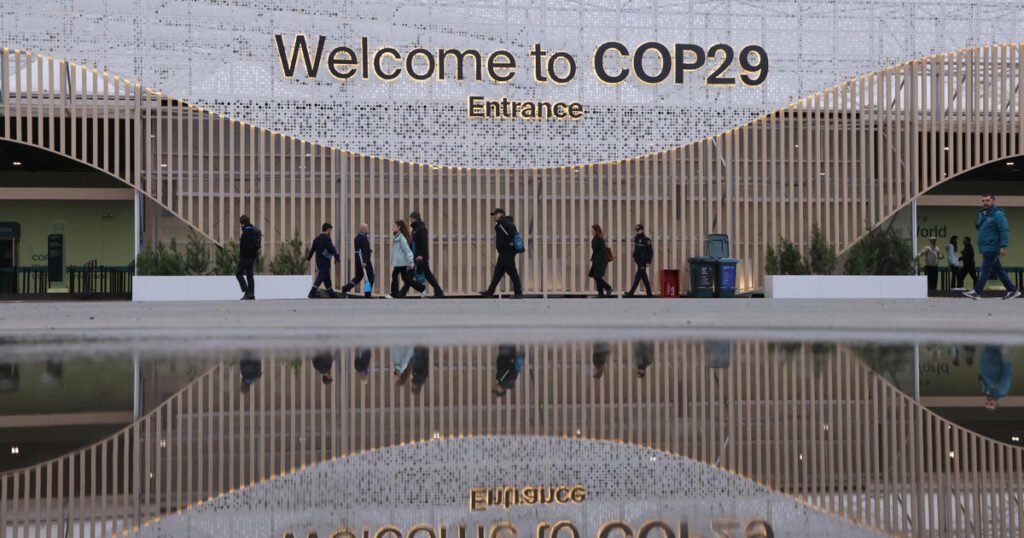[ad_1]
Nations agreed on a deal to inject at the least $300 billion yearly in humanity’s combat in opposition to local weather change, aimed toward serving to poor nations address the ravages of worldwide warming at tense United Nations local weather talks within the metropolis the place trade first tapped oil.
The $300 billion will go to growing nations who want the money to wean themselves off the coal, oil and gasoline that causes the globe to overheat, adapt to future warming and pay for the harm attributable to local weather change’s excessive climate. It’s not close to the total quantity of $1.3 trillion that growing nations had been asking for, nevertheless it’s 3 times the $100 billion a 12 months deal from 2009 that’s expiring. Delegations stated this deal is headed in the suitable path, with hopes that more cash flows sooner or later.
“Everyone is dedicated to having an settlement,” Fiji delegation chief Biman Prasad stated because the deal was being finalized. “They don’t seem to be essentially glad about every part, however the backside line is all people needs a superb settlement.”
It’s additionally a vital step towards serving to nations on the receiving finish create extra formidable targets to restrict or lower emissions of heat-trapping gases which are due early subsequent 12 months. It’s a part of the plan to maintain reducing air pollution with new targets each 5 years, which the world agreed to on the U.N. talks in Paris in 2015.
The Paris settlement set the system of standard ratcheting up local weather combating ambition as away to maintain warming underneath 1.5 levels Celsius above pre-industrial ranges. The world is already at 1.3 levels Celsius and carbon emissions hold rising.
Nations additionally anticipate that this deal will ship alerts that assist drive funding from different sources, like multilateral growth banks and personal sources. That was at all times a part of the dialogue at these talks — wealthy nations didn’t assume it was reasonable to solely depend on public funding sources — however poor nations fearful that if the cash got here in loans as a substitute of grants, it could ship them sliding additional backward into debt that they already wrestle with.
“The $300 billion aim is just not sufficient, however is a vital down fee towards a safer, extra equitable future,” stated World Assets Institute President Ani Dasgupta. “This deal will get us off the beginning block. Now the race is on to lift way more local weather finance from a spread of private and non-private sources, placing the entire monetary system to work behind growing nations’ transitions.”
It’s greater than the $250 billion that was on the desk within the first draft of the textual content, which outraged many nations and led to a interval of frustration and stalling over the ultimate hours of the summit. After an preliminary proposal of $250 billion a 12 months was soundly rejected, the Azerbaijan presidency brewed up a brand new tough draft of $300 billion, that was by no means formally offered, but in addition dismissed roundly by African nations and small island states, in response to messages relayed from inside.
The a number of completely different texts adopted early Sunday morning included a imprecise however not particular reference to final 12 months’s International Stocktake accredited in Dubai. Final 12 months there was a battle about first-of-its-kind language on eliminating the oil, coal and pure gasoline, however as a substitute it known as for a transition away from fossil fuels. The newest talks solely referred to the Dubai deal, however didn’t explicitly repeat the decision for a transition away from fossil fuels.
Nations additionally agreed on the adoption of Article 6, creating markets to commerce carbon air pollution rights, an concept that was arrange as a part of the 2015 Paris Settlement to assist nations work collectively to cut back climate-causing air pollution. A part of that was a system of carbon credit, permitting nations to place planet-warming gasses within the air in the event that they offset emissions elsewhere. Supporters stated a U.N.-backed market may generate as much as an extra $250 billion a 12 months in local weather monetary support.
Regardless of its approval, carbon markets stay a contentious plan as a result of many consultants say the brand new guidelines adopted don’t stop misuse, don’t work and provides massive polluters an excuse to proceed spewing emissions.
“What they’ve achieved basically is undermine the mandate to attempt to attain 1.5,” stated Tamara Gilbertson, local weather justice program coordinator with the Indigenous Environmental Network. Greenpeace’s An Lambrechts, known as it a “local weather rip-off” with many loopholes.
With this deal wrapped up as crews dismantle the short-term venue, many have eyes on subsequent 12 months’s local weather talks in Belem, Brazil.
[ad_2]
Source link
